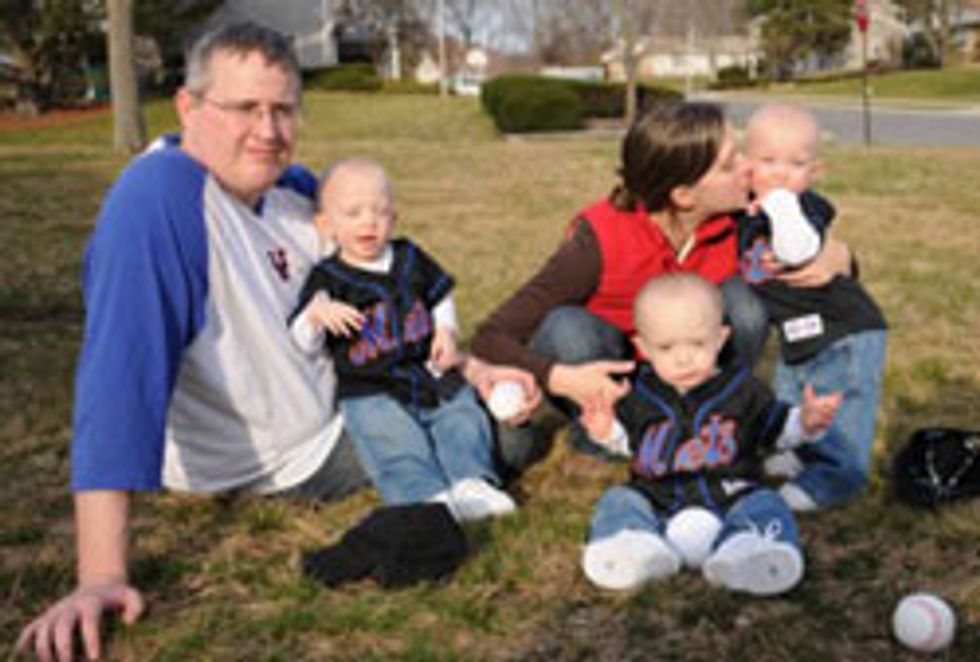With a new baby comes countless hours of joy and amazement—and an endless procession of changing diapers, giving bottles and checking on sleep monitors. Having one infant at home is hard, but having two, three or more brings a whole new set of challenges. For Jessica and Larry, parents to toddler triplet boys, the endless cycle of caretaking is intimately familiar. Born 12 weeks premature, Jack, Larry and Sean have provided an adventure from the get-go.
With developments in fertility treatments and the growth of assisted reproductive technologies (such as in vitro fertilization, or IVF, among others), multiple births like Jessica's are no longer uncommon. In this country, just over three percent of babies are born alongside siblings. Births of triplets or more are far less common than twins, rarely occurring spontaneously and most often associated with fertility treatments. And though the chance of becoming pregnant with multiples is still small, for those who do, life can kick into overdrive pretty quickly. That's Jessica's and Larry's story.
The Pregnancy and Delivery
Jessica underwent a treatment called controlled ovarian hyperstimulation (COH), where fertility medications are used to encourage a woman's ovaries to accelerate eggs to grow and mature. This was followed by intrauterine insemination (IUI), in which a concentrated sample of sperm is placed through the vagina and cervix directly into the uterus via a flexible catheter.
Like many pregnancies involving multiples, Jessica's was considered high risk, and she was put on bed rest for an extended time. She went into preterm labor at 18 weeks and was found to have an incompetent cervix, which means that the cervix is weak and beginning to open before a baby is ready to be born. She had her cervix stitched (cerclage) at 18 weeks but at 23 weeks she had another scare—previewing full-blown labor. Doctors were able to stop contractions using various interventions.
Jessica's water broke in the early morning of October 29, 2006, 12 weeks before her due date. They tried to stop labor, but the contractions were coming on too quickly. She quickly dilated to seven centimeters, at which point she was rushed in for a C-section. The boys were born later that morning at 11:17 (Jack Thomas), 11:19 (Lawrence Paul III) and 11:22 (Sean Michael). "We purposely named them in alphabetical order so that the oldest was not named after his father," says Jessica. "We wanted the middle child to have that name, as to not have 'middle child syndrome' later in life. We'll see if it makes a difference!"
The boys were immediately brought to the neonatal intensive care unit (NICU), where they stayed for what seemed like an eternity to their new parents. Sean came home first, after eight weeks. Larry followed a week later, and finally Jack, after 12 weeks (on Jessica's original due date). He had a difficult time feeding and was later diagnosed with reflux. "It was initially very hard for me to go home without them, yet I knew they were in the best hands possible," says Jessica, who remains close to two of their NICU nurses.
The next challenge was leaving Larry and Jack at the hospital when Sean was able to come home, and then again leaving Jack behind. "I was home alone with two babies all day and then had to wait for someone to come later in the day to stay with them so I could go see Jack," says Jessica. "I felt guilty that I didn't spend as much time with him, but having them come home one at a time was really the best for us. We had no idea what to do with one baby, no less three!"
The Newborn Days
"All I can say is, I would never go back to the newborn days again," says Jessica. "I never really knew what sleep deprivation was until all three boys were home." Many nights consisted of less than two hours of solid sleep for the entire family.
Eventually Jessica and Larry figured out how to make it work for them, utilizing a feeding schedule. "While I would have loved to have fed them every time they were hungry, that's all I would have done—24 hours a day," says Jessica. Instead, the boys were fed every three to four hours, at the same time. If they didn't eat, they were offered a small bottle an hour and a half later, or they had to wait until the next feeding. The same thing goes now—if they don't eat dinner, they'll have breakfast in the morning. "I refuse to run a diner!" Jessica jokes.
To make sure things progressed smoothly, the couple kept a log that included what time the babies ate and how much, how many wet or dirty diapers each had, and any medications they received. Two of the boys took daily medications, and all three were on apnea monitors for three months to monitor heart rate and breathing.
Surprisingly, it wasn't the medical needs or the feeding schedules that proved most challenging for the triplets' parents: "I think our biggest challenge during the newborn months was learning how to be a family," says Jessica. Assimilating one new being into a family is tricky, but with three or more, it can be extremely challenging. Having support is vital. "It was very difficult for Larry to accept help in the beginning, and this put quite a strain on our relationship," she says. "We fought a lot, but we worked through it."
As with many couples, newborn stress paired with unstable hormones and sleep deprivation took a toll on their relationship. "The easiest person to take it out on is your spouse," explains Jessica. "So, once we were able to manage the three of them on our own more comfortably and get into a routine, things were a lot better in this house."
Another challenge common to a family that goes from two to four, five or more is finances. "One book I read said that you instantly go from DINK (double income, no kids) to SINK (single income, numerous kids). That is totally the truth!" says Jessica, who was out on disability for months before having the babies and then home taking care of her new family because child care would have cost too much. Formula alone cost them $400 a month.
They relied heavily on donations and the kindness and generosity of friends and family. There were days when they opened the front door to find a case of diapers that someone had dropped off. "We will never be able to pay those people back monetarily, but it has made us try and be better people, and now that we're more financially secure, we 'pay it forward' as often as we can," she says.
Despite the grueling daily challenges, there was plenty of joy in those early days. "I loved putting them all in bed with us on a Saturday morning and just looking at what an amazing family we created," she recalls. "It was those moments that made me realize that everything we went through was so worth it."
The Toddler Months
At almost two, Jack, Larry and Sean are growing fast. "All I can say is thank god they're cute," jokes Jessica. Though it can be exhausting, their family is having a great time discovering the world together. Their parents describe them as "little sponges" that soak everything up.
Often exchanging hugs and kisses and bringing each other toys, the brothers are starting to bond. "Sometimes I'll find them on the floor cuddled together. It is the sweetest thing," says Jessica. "Don't get me wrong, I still break up at least 50 fights a day, with biting and hitting involved, but that's just part of having siblings."
Yet, developing their own independent personalities is encouraged. Jessica tries to give them each some time to be alone, which they really enjoy, she says. "At times I feel guilty that I can't give them more, but they don't seem to mind."
The House: Staying Organized
This really goes in stages, says Jessica.
What the house looked like when they arrived home from the hospital: Neat and organized with all the bottles filled with powder lined up on the counter. All the necessary items (bibs, diapers, burp cloths) were set up in each room. A big crib was located downstairs, along with three baby chairs. Another crib was set up in the bedroom where the boys could sleep together until they started to get too big.
Their house now: "It's just crazy!" There are gates everywhere, including around all of our furniture so they can't climb on it. Three high chairs are at the main kitchen table and a small table for the boys because "they are literally jumping out of their high chairs." They are in one room together with their own cribs. Larry Junior now has a tent on his so he can't jump out anymore. Also, there are cabinet locks all over and special door handle protectors. "This too shall pass," Jessica assures herself. "In a few months they will have better safety awareness, and we'll move on to the next thing. It's just a learning experience for all of us."
Organization tips from Jessica? Try from the beginning to designate areas for things and then keep them there. For instance, have specific bins for toys and books to help keep the living area neat. Also, invest in rolling storage racks for the garage or other storage area to store diapers, wipes, and other space-taking necessities.
Support Team
For families with multiples, it is important to have a support network. For Jessica and Larry, this consists largely of Jessica's mom, who retired in January to help out. This allows Jessica to go to work one full day a week and to maintain sanity while at home. "We tease my mom that she is like our nanny/housekeeper, but we really couldn't do it without her!" Both sets of grandparents visit often, as well as siblings, friends and other valued volunteers. "We would not be here today if we did not have the wonderful people in our life that we do," she says.
Being in a community with other parents of multiples can be extremely valuable. Just hearing someone say "I know exactly what you are talking about" can help with the realization that your feelings, emotions and daily experiences are "normal." Jessica finds support in a Mothers of Multiples group.
Jessica's Important Reminders
Life goes on—mess, dirt and all.
There are days when I just want to cry because I feel like my house is chaos 24 hours a day. I rarely get to take a shower and sometimes don't brush my teeth until the afternoon. But really, who cares? We are not the picture of perfection, but we're happy. We have three of the happiest children I know, and that's what is important—not how clean your house is or how good you look.
You can endure.
Larry and I rarely have alone time together, and although we still fight, I think our marriage is so much better now because of everything that we've been through. I just have to remember how much we've been through and how strong we are now because of it.
Everything you go through is temporary.
When you want to scream because you're not sleeping, just know it won't last forever. When you want to cry because you're afraid you're running out of money, it will work itself out. When you are so upset because you have no furniture left because all they do is climb and jump, it only lasts a few months. And then you look back and it's over. You can be so proud of what you've accomplished as a family.
Don't be afraid to ask for help.
There are so many people who are out there who really want to help you. Whether it's friends, family members, people from church, work, etc.—let them help. It does not make you a bad parent if you accept help. I have found that when I take a step away for awhile, it actually makes me a more patient mom.








